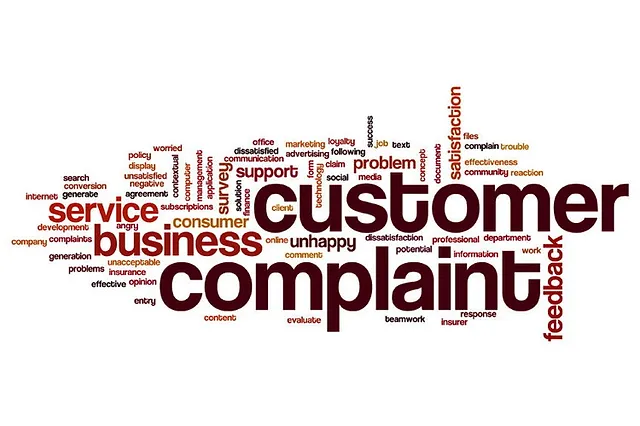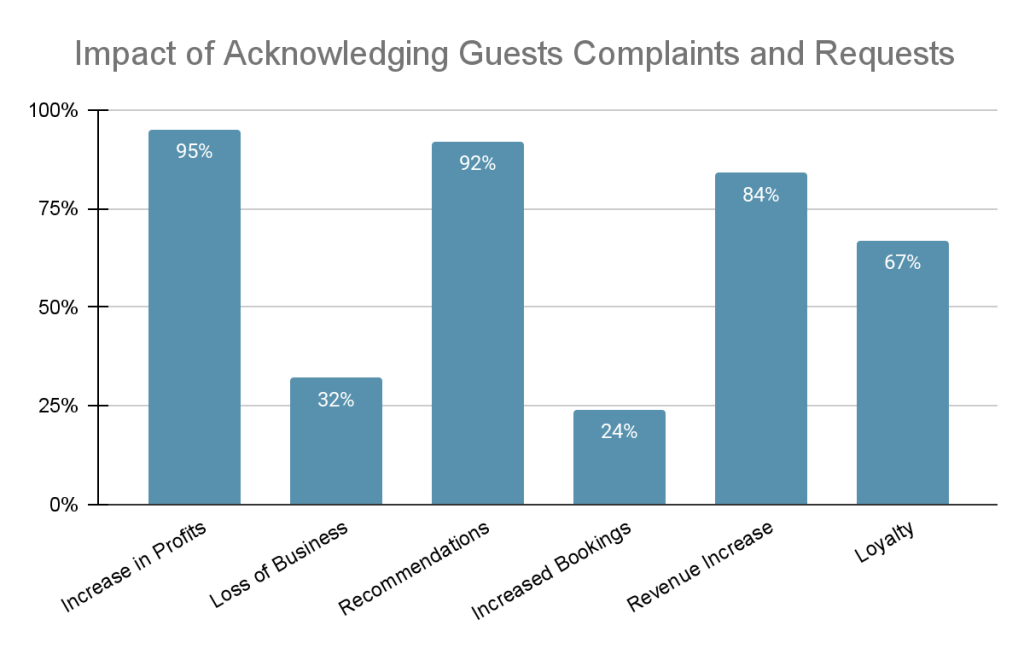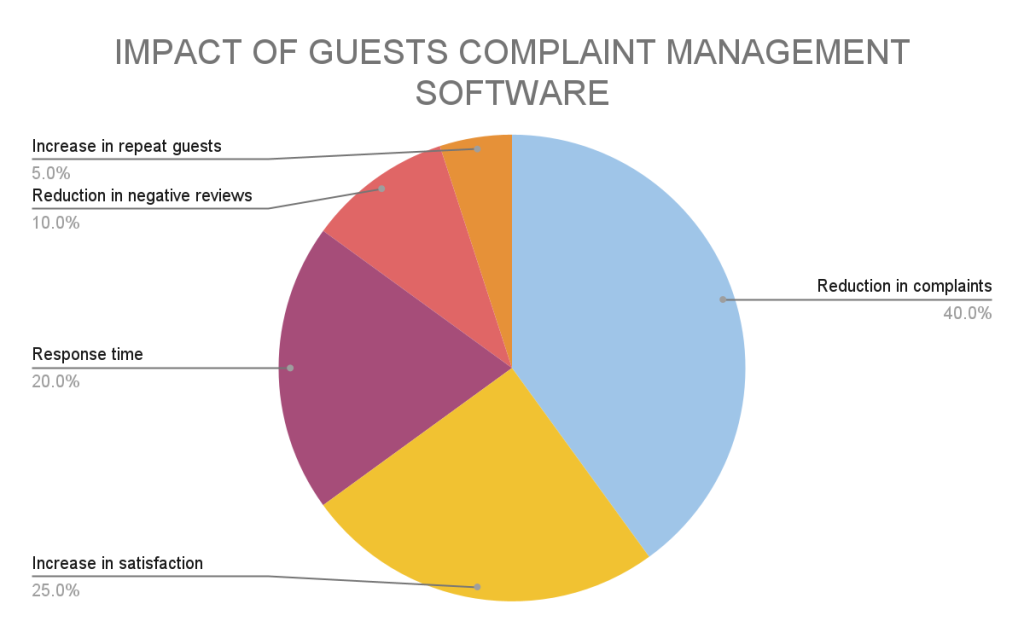
In the hospitality industry, guest satisfaction is the cornerstone of the business. Being an intensively service-oriented sector, guests define the reputation and profit of the hotels.
Satisfied guests are more likely to return, provide positive reviews, and recommend the hotel to others, which drives repeat business and attracts new customers.
Ensuring guest satisfaction not only means meeting guests’ expectations; it’s about exceeding them to create memorable experiences that promote loyalty and positive word of mouth for the hotel.
A negative hotel customer experience has the potential to affect a property’s success in a variety of ways.
A bad word-of-mouth review by a single customer can significantly deter potential customers from booking a stay in the hotel.
This blog post explores 11 practical ways for addressing guest complaints, transforming negative experiences into opportunities for growth and enhanced guest satisfaction.
1. ACKNOWLEDGE THE REQUEST AND COMPLAINTS IMMEDIATELY
In the hospitality industry, acknowledging guest requests and complaints immediately is crucial for maintaining high levels of customer satisfaction.
When hotel staff quickly acknowledge guest requests and complaints, it shows that the hotel values its guests and is committed to providing excellent service making them feel appreciated and respected.
For instance, if a guest reports a leaky faucet and the staff promptly acknowledges the complaint, the guest feels heard and valued even if the repair takes a little time.
By prioritizing immediate acknowledgment, hotels can improve guest satisfaction, encourage positive reviews, and foster loyalty, ultimately contributing to the hotel’s success.

2. COME UP WITH THE SLA FOR VARIOUS GUEST COMPLAINTS
A Service Level Agreement (SLA) for guest complaints is a set of guidelines that specify how quickly the staff should respond to and resolve issues raised by the guests.
Every hotel should establish an SLA to specify a timeframe for addressing and resolving specific complaints according to their service hours.
For instance, if a guest complains about the noisy room, the SLA might state that the staff must acknowledge within 15 minutes and resolve the complaint by fixing the noise or offering a different room.
It also includes regular communication with guests to keep them informed about the status of their complaints and ensure the issue is being addressed.
3. COLLECT GUEST FEEDBACK
Collecting feedback from guests helps in guest complaint management by enabling hotels in the hospitality industry to identify issues promptly and address guest concerns effectively.
By actively seeking and analyzing guest feedback hotels can pinpoint recurring complaints or dissatisfaction trends.
This proactive approach helps hotels to improve customer experiences, resolve specific guest issues, and prevent future complaints.
It provides valuable insights to hotels enabling them to improve their services and boost customer satisfaction.
UNDERSTANDING CUSTOMER NEEDS THROUGH FEEDBACK CAN RESULT IN A 10% INCREASE IN REVENUE AND A 4% DECREASE IN CHURN RATE.
Source: Internet
4. STAFF TRAINING IN EFFECTIVELY DEALING WITH GUEST COMPLAINTS
“HOSPITALITY IS ALMOST IMPOSSIBLE TO TEACH; IT’S ALL ABOUT TRAINING THE STAFF CORRECTLY.”
Staff are the direct dealers with the guests in any hotel. Staff must be trained to handle guests’ complaints promptly and professionally to enhance their satisfaction.
Staff training involves training the staff to listen actively to the guests, empathize with their concerns, and respond calmly and politely.
For instance, if the guest complained about a room being too hot, a well-trained staff would acknowledge the complaint immediately, apologize for the inconvenience and offer a solution i.e. adjusting the room temperature or providing a cooler.
Training programs improve employees’ knowledge, skills, and confidence, enabling them to handle diverse situations.
WELL-TRAINED STAFF CAN ENHANCE THE RESOLUTION OF GUEST COMPLAINTS BY APPROXIMATELY 25 – 30%.
Source: Journal of Applied Marketing Theory
5. USING GUEST COMPLAINT MANAGEMENT SOFTWARE
Bill Gates – The Father of Microsoft says “IN ALMOST EVERY INDUSTRY, SOFTWARE IS USED TO ENABLE THEIR ORGANIZATION TO OPERATE MORE EFFECTIVELY”
Using guest complaints and requests management software has proven efficient and enhances the guest experience.
The software allows the staff to log complaints as soon as they are received, ensuring no complaints are overlooked.
It also enables staff to update the status of the complaint, keep track of response and resolution times, and send notifications to managers if an issue isn’t resolved promptly.
It provides a centralized system where all complaints are stored, making it easy to analyze trends and identify areas for improvement.
By using complaint management software, hotels can streamline their complaint-handling process, ensure quick resolutions, and enhance overall guest satisfaction.

6. SETTING UP A DEDICATED HOTLINE NUMBER FOR THE GUESTS TO RAISE COMPLAINTS
A hotline number is a special phone number that guests can call to report an issue, or a complaint directly.
When a guest calls the hotline number, they are directly connected to the team responsible for resolving complaints and providing immediate support and solutions.
For example, if a guest has a problem with their room, they can call the hotline and speak to someone who will ensure the issue is addressed promptly.
This dedicated hotline number ensures that the complaints are not missed or delayed as it directly goes to the team responsible for resolving them.
APPROXIMATELY 40 HOTELS OUT OF 50 USE THE HOTLINE NUMBER TO REPORT THE ISSUE.
Source: Internet
7. FOLLOW UP AFTER RESOLUTION OF GUEST REQUESTS AND COMPLAINTS
In the hospitality industry, following up after resolving guest requests and complaints is crucial to ensure that the guest’s issue has been fully addressed and that they are satisfied with the resolution.
Once a complaint or request is addressed, a hotel staff member should reach out through a phone call, a personal visit, or a message to the guest to confirm that the issue has been resolved to their satisfaction.
This can turn a negative experience into a positive one by demonstrating a commitment to excellent service.
A successful follow-up can enhance the guest’s perception of the hotel, increasing the likelihood of return visits and positive word-of-mouth recommendations.
ACCORDING TO SURVEY REPORTS ON HOTELS WITH FOLLOW UP HAS SHOWN UP TO 20% INCREASE IN CUSTOMER SATISFACTION SCORE (CSAT) AND UP TO 15 – 30% INCREASE IN NET PROMOTER SCORE (NPS).
Source: Internet
8. CREATE AN SOP FOR PROVIDING THE GUEST SERVICE
A Standard Operating Procedure (SOP) is created to provide guest services in the hospitality industry and involves outlining step-by-step guidelines for staff to follow when interacting with guests.
This includes everything from check-in and check-out procedures to handling guest requests and resolving complaints.
The SOP should be clear, concise, and easy to follow, with specific guidelines for each process step.
For instance, the SOP might include steps such as:
- Greeting guests warmly and offering assistance.
- Providing a thorough overview of hotel amenities and services.
- Handling guest requests and complaints in a timely and professional manner.
- Ensuring that guest rooms are clean and well-maintained.
- Providing prompt and efficient check-in and check-out procedures.
An SOP helps strengthen a brand name by ensuring consistent, high-quality service regardless of individual needs or preferences across all the different properties under the same name which leads to an increase in the number of repeat customers.
9. UPDATE TO THE LATEST TECHNOLOGY TO PROVIDE THE BEST GUEST SERVICE
“THE FUTURE OF GUEST SERVICE LIES IN THE SEAMLESS INTEGRATION OF INNOVATIVE TECHNOLOGY.”
The use of technology enhances guest experiences and simplifies operations, making stays more enjoyable and efficient.
For example, implementing mobile check-in and check-out processes allows guests to save a lot of time rather than waiting in long queues.
Hotels with smart room technology, such as voice-controlled assistants and automated lighting, offer guests personalized and comfortable experiences.
Integrating technology in housekeeping and maintenance, like smart sensors and mobile apps, ensures timely room cleaning and quick responses to maintenance issues, enhancing overall guest satisfaction.
High-speed internet access throughout the hotel is essential for business travelers and leisure guests who stream content online.
30 – 40% OF THE GUESTS PREFER STAYING IN THE SMART HOTELS TO THE TRADITIONAL HOTELS AND THE GUEST SATISFACTION RATE OF THE SMART HOTELS IS 5% HIGHER THAN THE TRADITIONAL HOTELS.
Source: Internet
10. RECOGNIZE AND APPRECIATE THE STAFF FOR PROVIDING A GOOD SERVICE
Acknowledging the efforts of staff members who go above and beyond in delivering exceptional service is not just a gesture of gratitude; it’s a way to increase a positive work culture and enhance guest satisfaction.
When employees feel valued and appreciated, they are more motivated to maintain high standards of excellent service which increases positive word-of-mouth marketing.
Recognizing staff can take various forms, such as employee of the month awards, personalized notes from management, or even small tokens of appreciation like gift cards or extra time off.
These gestures not only make employees feel valued but also motivate other employees to serve guests efficiently and promote a service-oriented mindset among other employees.
A STUDY FOUND THAT ORGANIZATIONS WITH HIGH EMPLOYEE RECOGNITION EXPERIENCED 10% HIGHER CUSTOMER RATINGS AND 20% HIGHER SALES THAN WITH LOW RECOGNITION LEVELS.
Soource: Internet
11. MONITOR AND ANALYZE THE REPORTS TO UNDERSTAND WHERE IMPROVEMENT IS REQUIRED
Monitoring and analyzing reports are essential practices for identifying areas where improvement is needed.
By carefully examining these reports, you can pinpoint specific areas that require attention or enhancement.
Analyzing reports not only helps in identifying areas of weakness but also provides valuable insights into guest preferences and market trends.
For example, if a hotel notices a growing demand for an increasing number of guests booking through online travel agencies, it can emphasize more on that accordingly to stay competitive in the market.
CONCLUSION
Effectively identifying guest complaints in the hotel industry requires a comprehensive strategy that combines both traditional and modern approaches.
When complaints are addressed promptly and empathetically, guests feel valued and heard, which can turn a potentially negative experience into a positive one.
Positive resolutions can lead to favorable word-of-mouth and online reviews, attracting new customers.
In essence, effective complaint management not only resolves issues but also strengthens guest relationships, boosts satisfaction, and contributes to the hotel’s long-term success.